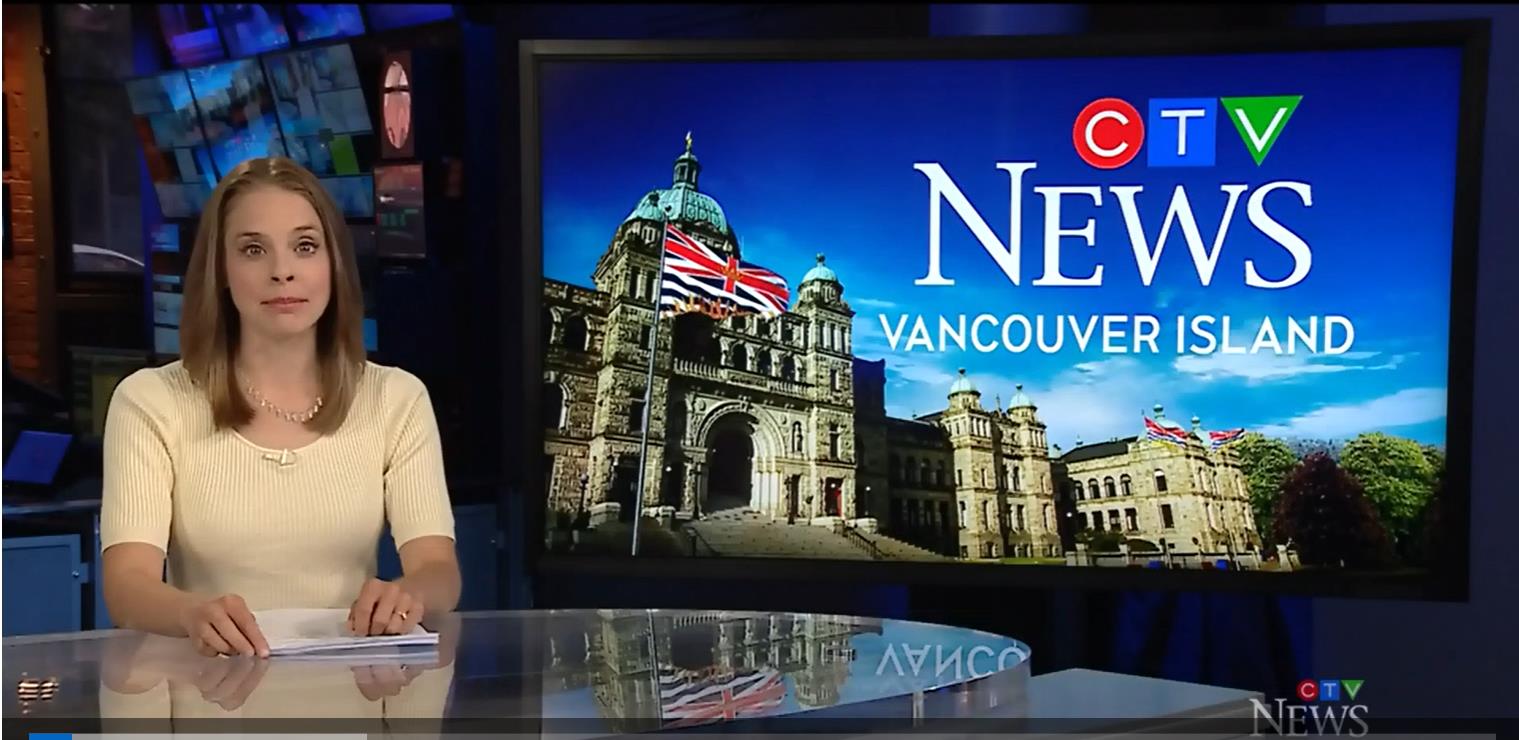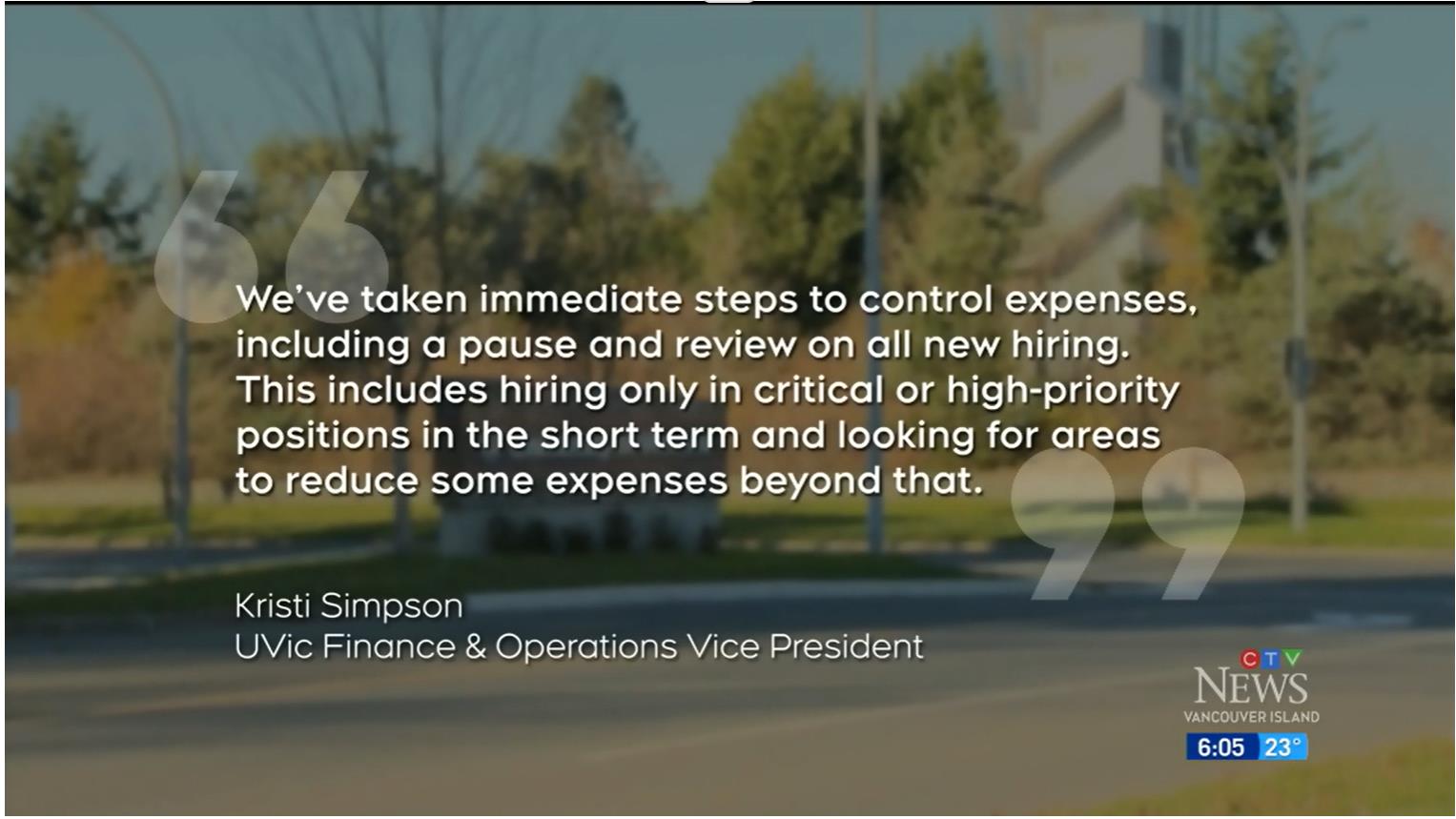

The University of Victoria’s campus is again buzzing with students, but a shortfall of them during the pandemic and an ongoing lack of international students means tuition revenue is down.
Hope Armstrong is a fourth-year student in the marine biology program. She says classroom instructors are already stretched thin.
“In the labs, there’s always shortages of TAs and profs are always overloading their classes trying to compensate,” said Armstrong on Monday.
The school blames the decline in international students on a hangover from COVID-19, as well as inflation, a housing shortage and delays processing international visas.
The university is dealing with a forecasted deficit of $17 million and has asked for campus-wide budget cuts of six per cent. It is also imposing sweeping limitations on new hires, both for academic and non-academic positions.
“We’ve taken immediate steps to control expenses, including a pause and review on all new hiring,” the university said in a statement. “This includes hiring only in critical or high-priority positions in the short term and looking for areas to reduce some expenses beyond that.”
Multiple students who CTV News spoke with expressed concern that the school was implementing a temporary halt on hiring new staff.
It’s not just students being impacted. Employees say putting the brakes on most new hires, along with potentially a halt on buying new equipment, will hurt.
Kirk Mercer is the president of the local CUPE union, which has approximately 900 full- and part-time employees at UVic.


He says the union’s members had been optimistic that workloads and stress were improving as we moved out of the pandemic, but this latest news is discouraging. “Pushing back to doing more with less, which unfortunately we’ve been doing for far too long,” said Mercer.
Decreased enrollment coming out of the pandemic is also being blamed in Nanaimo, where Vancouver Island University says it’s forecasting a deficit of $5.3 million this year.
Post-secondary schools aren’t allowed to run deficits without the province’s approval. The province says VIU hasn’t applied yet for approval to run a deficit. Staff at VIU tell CTV News that the school is working closely with the school on its financial plans to return to a balanced budget.
Meanwhile North Island College says it started the school year with a deficit of approximately $800,000 — a shortfall it too attributes to recovery from the pandemic.
Royal Roads University says it does not forecast a deficit this year.
As for UVic and its shortfall, the school has advised CUPE leadership it expects its cost-cutting measures to be finished by the spring.
Published Wed, Oct 5 202211:26 AM EDTUpdated Wed, Oct 5 202212:16 PM EDT
Jessica Dickler@jdickler
Key Points
- Enrollment declines and underfunding have hit the higher education system hard.
- Post-pandemic, a number of colleges are in financial jeopardy.
- Deep cuts in state funding for higher education have pushed more of the costs on to students and paved the way for significant tuition increases.
Increasingly, high school students are rethinking the value of college, with a growing number of them questioning the return on investment. Some have decided against a four-year degree.
To be sure, undergraduate enrollment was falling even before the pandemic, but remote learning — coupled with the sky-high cost of college — triggered a nosedive. The number of undergraduates enrolled in college nationwide is now down 9.4% compared to two years ago — a loss of nearly 1.4 million students.
Those steep declines caused tuition revenue to fall, putting some schools in financial jeopardy. A few have had to shut down entirely.
“I worry that the trend is going to continue because nobody is doing anything to improve affordability, and universities are going to continue to suffer,” said Hafeez Lakhani, founder and president of Lakhani Coaching in New York City.
More colleges are struggling financially
Lincoln College in Lincoln, Illinois, closed at the end of the spring semester.
“Lincoln College has been serving students from across the globe for more than 157 years,” President David Gerlach said. “The loss of history, careers and a community of students and alumni is immense.”
The San Francisco Art Institute closed after 150 years. Marymount California University in Rancho Palos Verdes and Becker College in Worcester, Massachusetts, also recently shut their doors. As have other institutions across the country.
The number of colleges closing down in the past 10 years has quadrupled compared with the previous decade, according to a report in The Wall Street Journal.
Today, I’m here to share some of the results of that ongoing work, and the…
To ensure the temporary residents we welcome to Canada can be supported adequately, the Honourable…
Upload a file The form could not be submitted because errors were found. Error: We…
Ottawa—Canada is a top destination for international students, thanks to our high-quality educational institutions; our welcoming,…
How we calculated this processing time This processing time tells you how long it took…
Applicants who have received a positive Stage 1 assessment may be eligible for interim status…